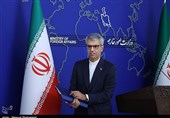Regional Outrage after Israeli Attack on Iranian Soil
TEHRAN (Tasnim) – The Israeli attack on Iran has triggered swift condemnation from regional countries, with Jordan, Qatar, and Kuwait denouncing the strikes as violations of international law and urging restraint to prevent further escalation.
Qatar denounced the Israeli attack on Iran and urged all parties to exercise restraint, avoid actions that undermine security, and resolve disputes through dialogue.
Jordan described the attack as a violation of international law and Iranian sovereignty, cautioning that the escalation could lead to a war that threatens regional and global stability.
Amman emphasized the need for the international community to act swiftly to stop violence in Gaza, the West Bank, and Lebanon.
Kuwait also condemned the attack, labeling it an aggression by Israel.
Syria issued a statement condemning the assault in the strongest terms, calling it an act of blatant aggression.
Oman's Foreign Minister, Badr Al-Busaidi, expressed deep concern. He urged the world to address the root causes of the crisis, particularly Israel’s illegal occupation of Palestinian territories. Oman's foreign ministry similarly described the attack as a flagrant violation of Iran's sovereignty and international law.
The UAE echoed the condemnation, emphasizing the importance of diplomatic efforts to resolve disputes.
Turkey’s foreign ministry also issued a strong condemnation, calling the attack on Iran unacceptable.
Pakistan's Prime Minister Shehbaz Sharif expressed deep concern over Israel’s actions, condemning them for violating international law and threatening regional peace. Sharif affirmed Pakistan's solidarity with Iran and its neighbors in seeking peace and urged all parties to exercise restraint to prevent further escalation.
The Iraqi government criticized Israel for its expansionist policies, accusing it of prolonging conflict in the region. Iraqi Sunni cleric Sheikh Mahdi Al-Sumaidaie condemned the violation of Iraqi airspace, expressing disappointment in Iraq's air defense systems for their failure to respond. He urged the prime minister to take action and prevent further weaknesses.
Moqtada al-Sadr, an influential Iraqi leader, downplayed the attack, stating that it reflects Israel's inner turmoil. He argued that the attack, though a violation of sovereignty, reveals Israel's anxiety and confusion.
Yemen’s Ansarullah movement also condemned the attack, with senior official Mohammed Ali Al-Houthi asserting that Israel’s actions would not alter Iran’s principled stance in support of the Palestinian cause.
Egypt’s foreign ministry expressed concern over the assault, warning that such actions threaten both regional and global stability.
Switzerland's foreign ministry condemned the rise in tensions in the Middle East, including the recent Israeli airstrikes on Iran, and called for an immediate cessation of hostilities to avoid regional destabilization.
France refrained from explicitly condemning the attack, instead calling on all sides to avoid provocative actions that could exacerbate tensions.
Iran responded to the Israeli attack by asserting its right to self-defense under Article 51 of the UN Charter. Tehran expressed gratitude to regional and global partners who condemned Israeli aggressions and reiterated that the ongoing occupation and violence by Israel—particularly against Palestinians and Lebanon—are the primary sources of instability, with US and Western support enabling these actions.





